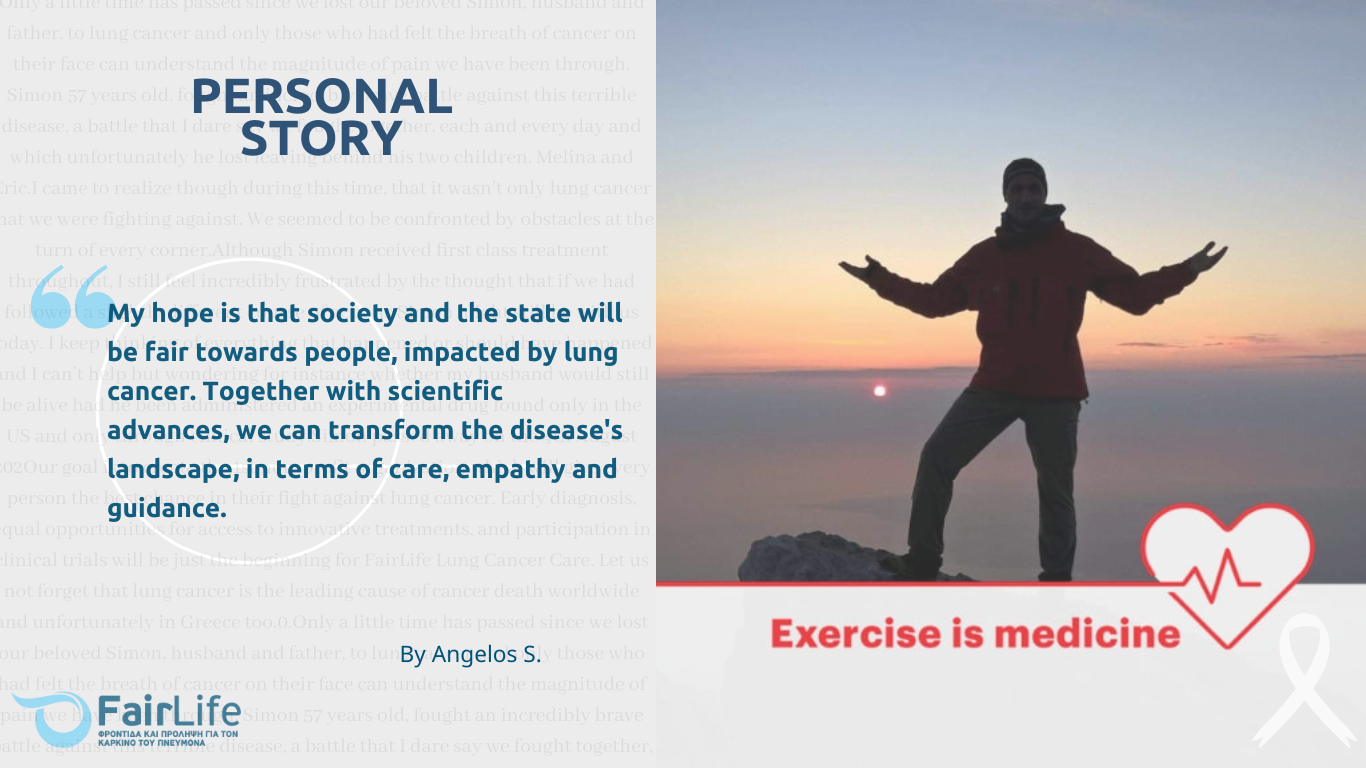
I’ve always known, this would be a difficult, painful, exhausting path.
By Angelos S. ,caregiver, 54 years old.
My family and I will always remember Christmas 2020. A few days before, my 58 year old wife had felt a neck lump during her daily personal care routine. I tried to reassure her but we both were deeply concerned. On the very next day we went to a doctor and required tests were carried out. The news was discouraging. A pulmonologist suggested a lymph node biopsy, which revealed cancer. We received the results on Christmas Day and by the first days of January we knew it was Stage III inoperable lung cancer.
Holidays were depressing and full of concern of what the future might hold. Right from the start, I tried to run procedures as quickly as possible, to buy us some time, to have the best possible outcome. This was a changing point in our lives. A series of chemotherapy, chest radiation and immunotherapy followed. The necessary molecular testing was performed after diagnosis, where no biomarker was found, which could lead to targeted therapy. My wife has undergone 6 different chemotherapy plans so far. She has been in and out of hospitals and she has felt all the exhausting, painful side effects of treatments. In summer of 2022, daily radiation was attempted combined with chemotherapy once a week. . Time flew, a slight decrease in disease progression was noticed, followed by a period of several months without treatment. Unfortunately, just before the 2022 Christmas holidays, the condition got worse. My wife’s neurological condition started to change. I noticed loss of orientation, movement difficulties, and decreased vision. My fear of brain metastasis proved to be true. Brain radiation followed and we saw some clinical improvement. Meanwhile, the lung condition deteriorated and a new chemotherapy cycle resumed.
I’ve always known, this would be a difficult, painful, exhausting path.
I took the caregiver’s role, alone, with hardly any help, at a huge mental cost. Examination scheduling, doctor’s appointments, treatments, diagnostic tests, chemotherapy, radiation, everything had to be coordinated by me.
Day-to-day life with two teenage boys is demanding. My wife can no longer function at home, as she did before lung cancer. From the very beginning and thinking of our children first, I asked for psychological help and support to cope as best I could.
Cancer always comes at the wrong time. It is something you never expect. It’s out of your control. Out of your schedule. You assume you are in control of your life and then you realize how wrong you are. We were a happy family and all of a sudden, this. You wonder: “Is this true? Is it really happening?” Some days I feel like I’m a movie character and at some point it’s going to end. Alas, reality comes back every day to remind me!
Psychological support relieves me. I know I am not alone in this ocean.
Sure, facts don’t change, but the way I deal with the situation does. Support is so important both for patients living with lung cancer and for their caregivers as well, who often put their personal needs aside. While my wife was hospitalized, I asked for psychological support and I received No for an answer. In a state founded on the Rule of Law, patients and their families must have guidance, psychological support, benefits and rights, so as to fight the disease fairly and adequately. We need more organizations, like FairLife L.C.C., and we need the State to support them in their effort to help families, impacted by lung cancer.
I also sensed a lack of proper communication with the doctor who was monitoring my wife. When we met with the doctor, I felt at first I could not have the communication I needed, on a more personal level. . Along the way I’ve noticed an improvement, after all we are connected by a common goal.
What I truly need as a caregiver and family member is to have guidance and support on various issues, including medical advice, suggestions, bureaucratic issues, rights, benefits etc.
I have not found guidance and this is unfair to us all.
First to our patient and then to us, as caregivers. How do you fight the disease without proper support?
My wife has always smoked and she still does, very much against doctors’ advice and even though she had lost her mother to lung cancer.
After diagnosis, no one ever recommended a smoking cessation clinic, which we now know exist. Personally, I have always tried to follow a healthy lifestyle (exercise, healthy eating, avoiding smoking and alcohol) and I struggled to convince her against smoking, even before lung cancer diagnosis. My efforts were in vain. But I am not an expert, I have neither the means nor the proper way to do it.
In conclusion, I would like to express a complaint and send a message of hope.
My complaint is the loneliness I feel as a caregiver spouse, coping with lung cancer. Lung cancer is a marathon and to run the race, you need to have support both family wise and by the State.
My hope is that society and the state will be fair towards people, impacted by lung cancer. Together with scientific advances, we can transform the disease’s landscape, in terms of care, empathy and guidance.
As long as we keep on fighting, there is hope, and as long as we keep on hoping, we fight.
March 23, 2023